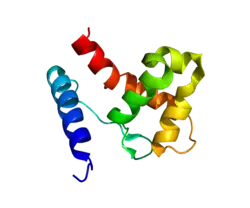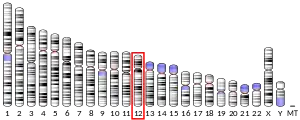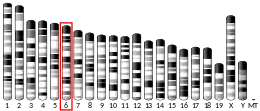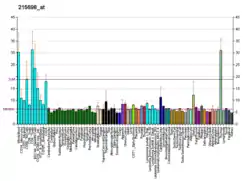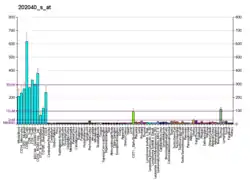Lysine-specific demethylase 5A is an enzyme that in humans is encoded by the KDM5A gene.[5][6]
Function
The protein encoded by this gene is a ubiquitously expressed nuclear protein. It binds directly, with several other proteins, to retinoblastoma protein which regulates cell proliferation. It was formerly known as Retinoblastoma Binding Protein 2 (RBP2). This protein also interacts with rhombotin-2 which functions distinctly in erythropoiesis and in T-cell leukemogenesis. Rhombotin-2 is thought to either directly affect the activity of the encoded protein or may indirectly modulate the functions of the retinoblastoma protein by binding to this protein. Alternatively spliced transcript variants encoding distinct isoforms have been found for this gene.[6]
The Drosophila homolog, LID, was found to be an H3K4 histone demethylase that binds to c-Myc.[7] It was recently renamed to Lysine Demethylase 5 (KDM5).
Enzymatically can be designated as a trimethyllysine dioxygenase, which is a member of the alpha-ketoglutarate-dependent hydroxylase superfamily (EC 1.14.11.8).
Interactions
JARID1A has been shown to interact with Estrogen receptor alpha,[8] LMO2[9] and Retinoblastoma protein.[8][10]
JARID1A is a major component of the circadian clock, the upregulation of which at the end of the sleep phase blocks HDAC1 activity. Blocking HDAC1 activity results in an upregulation of CLOCK and BMAL1 and consequent upregulation of PER proteins. The PSF (polypyrimidine tract-binding protein-associated splicing factor) within the PER complex recruits SIN3A, a scaffold for assembly of transcriptional inhibitory complexes and rhythmically delivers histone deacetylases to the Per1 promoter, which repress Per1 transcription.[11][12]
Knockdown of JARID1A promoted osteogenic differentiation of human adipose-derived stromal cells in vitro and in vivo and resulted in marked increases of mRNA expression of osteogenesis-associated genes such as alkaline phosphatase (ALP), osteocalcin (OC), and osterix (OSX). RBP2 was shown to occupy the promoters of OSX and OC to maintain the level of the H3K4me3 mark by chromatin immunoprecipitation assays. RBP2 was also physically and functionally associated with RUNX2, an essential transcription factor that governed osteoblastic differentiation. RUNX2 knockdown impaired the repressive activity of RBP2 in osteogenic differentiation of human adipose-derived stromal cells.[13]
References
- 1 2 3 GRCh38: Ensembl release 89: ENSG00000073614 - Ensembl, May 2017
- 1 2 3 GRCm38: Ensembl release 89: ENSMUSG00000030180 - Ensembl, May 2017
- ↑ "Human PubMed Reference:". National Center for Biotechnology Information, U.S. National Library of Medicine.
- ↑ "Mouse PubMed Reference:". National Center for Biotechnology Information, U.S. National Library of Medicine.
- ↑ Defeo-Jones D, Huang PS, Jones RE, Haskell KM, Vuocolo GA, Hanobik MG, Huber HE, Oliff A (Jul 1991). "Cloning of cDNAs for cellular proteins that bind to the retinoblastoma gene product". Nature. 352 (6332): 251–4. Bibcode:1991Natur.352..251D. doi:10.1038/352251a0. PMID 1857421. S2CID 4357523.
- 1 2 "Entrez Gene: JARID1A jumonji, AT rich interactive domain 1A".
- ↑ Secombe J, Li L, Carlos L, Eisenman RN (Mar 2007). "The Trithorax group protein Lid is a trimethyl histone H3K4 demethylase required for dMyc-induced cell growth". Genes & Development. 21 (5): 537–51. doi:10.1101/gad.1523007. PMC 1820896. PMID 17311883.
- 1 2 Chan SW, Hong W (Jul 2001). "Retinoblastoma-binding protein 2 (Rbp2) potentiates nuclear hormone receptor-mediated transcription". The Journal of Biological Chemistry. 276 (30): 28402–12. doi:10.1074/jbc.M100313200. PMID 11358960.
- ↑ Mao S, Neale GA, Goorha RM (Apr 1997). "T-cell oncogene rhombotin-2 interacts with retinoblastoma-binding protein 2". Oncogene. 14 (13): 1531–9. doi:10.1038/sj.onc.1200988. PMID 9129143.
- ↑ Kim YW, Otterson GA, Kratzke RA, Coxon AB, Kaye FJ (Nov 1994). "Differential specificity for binding of retinoblastoma binding protein 2 to RB, p107, and TATA-binding protein". Molecular and Cellular Biology. 14 (11): 7256–64. doi:10.1128/mcb.14.11.7256. PMC 359260. PMID 7935440.
- ↑ DiTacchio L, Le HD, Vollmers C, Hatori M, Witcher M, Secombe J, Panda S (2011). "Histone lysine demethylase JARID1a activates CLOCK-BMAL1 and influences the circadian clock". Science. 333 (6051): 1881–5. Bibcode:2011Sci...333.1881D. doi:10.1126/science.1206022. PMC 3204309. PMID 21960634.
- ↑ Duong HA, Robles MS, Knutti D, Weitz CJ (2011). "A molecular mechanism for circadian clock negative feedback". Science. 332 (6036): 1436–9. Bibcode:2011Sci...332.1436D. doi:10.1126/science.1196766. PMC 3859310. PMID 21680841.
- ↑ Ge W, Shi L, Zhou Y, Liu Y, Ma GE, Jiang Y, Xu Y, Zhang X, Feng H (2011). "Inhibition of osteogenic differentiation of human adipose-derived stromal cells by retinoblastoma binding protein 2 repression of RUNX2-activated transcription". Stem Cells. 29 (7): 1112–25. doi:10.1002/stem.663. PMID 21604327. S2CID 41977627.
Further reading
- Kim YW, Otterson GA, Kratzke RA, Coxon AB, Kaye FJ (Nov 1994). "Differential specificity for binding of retinoblastoma binding protein 2 to RB, p107, and TATA-binding protein". Molecular and Cellular Biology. 14 (11): 7256–64. doi:10.1128/mcb.14.11.7256. PMC 359260. PMID 7935440.
- Maruyama K, Sugano S (Jan 1994). "Oligo-capping: a simple method to replace the cap structure of eukaryotic mRNAs with oligoribonucleotides". Gene. 138 (1–2): 171–4. doi:10.1016/0378-1119(94)90802-8. PMID 8125298.
- Fattaey AR, Helin K, Dembski MS, Dyson N, Harlow E, Vuocolo GA, Hanobik MG, Haskell KM, Oliff A, Defeo-Jones D (Nov 1993). "Characterization of the retinoblastoma binding proteins RBP1 and RBP2". Oncogene. 8 (11): 3149–56. PMID 8414517.
- Baens M, Aerssens J, van Zand K, Van den Berghe H, Marynen P (Sep 1995). "Isolation and regional assignment of human chromosome 12p cDNAs". Genomics. 29 (1): 44–52. doi:10.1006/geno.1995.1213. PMID 8530100.
- Andersson B, Wentland MA, Ricafrente JY, Liu W, Gibbs RA (Apr 1996). "A "double adaptor" method for improved shotgun library construction". Analytical Biochemistry. 236 (1): 107–13. doi:10.1006/abio.1996.0138. PMID 8619474.
- Hillier LD, Lennon G, Becker M, Bonaldo MF, Chiapelli B, Chissoe S, Dietrich N, DuBuque T, Favello A, Gish W, Hawkins M, Hultman M, Kucaba T, Lacy M, Le M, Le N, Mardis E, Moore B, Morris M, Parsons J, Prange C, Rifkin L, Rohlfing T, Schellenberg K, Bento Soares M, Tan F, Thierry-Meg J, Trevaskis E, Underwood K, Wohldman P, Waterston R, Wilson R, Marra M (Sep 1996). "Generation and analysis of 280,000 human expressed sequence tags". Genome Research. 6 (9): 807–28. doi:10.1101/gr.6.9.807. PMID 8889549.
- Yu W, Andersson B, Worley KC, Muzny DM, Ding Y, Liu W, Ricafrente JY, Wentland MA, Lennon G, Gibbs RA (Apr 1997). "Large-scale concatenation cDNA sequencing". Genome Research. 7 (4): 353–8. doi:10.1101/gr.7.4.353. PMC 139146. PMID 9110174.
- Mao S, Neale GA, Goorha RM (Apr 1997). "T-cell oncogene rhombotin-2 interacts with retinoblastoma-binding protein 2". Oncogene. 14 (13): 1531–9. doi:10.1038/sj.onc.1200988. PMID 9129143.
- Suzuki Y, Yoshitomo-Nakagawa K, Maruyama K, Suyama A, Sugano S (Oct 1997). "Construction and characterization of a full length-enriched and a 5'-end-enriched cDNA library". Gene. 200 (1–2): 149–56. doi:10.1016/S0378-1119(97)00411-3. PMID 9373149.
- Chan SW, Hong W (Jul 2001). "Retinoblastoma-binding protein 2 (Rbp2) potentiates nuclear hormone receptor-mediated transcription". The Journal of Biological Chemistry. 276 (30): 28402–12. doi:10.1074/jbc.M100313200. PMID 11358960.
- Sandrock B, Egly JM (Sep 2001). "A yeast four-hybrid system identifies Cdk-activating kinase as a regulator of the XPD helicase, a subunit of transcription factor IIH". The Journal of Biological Chemistry. 276 (38): 35328–33. doi:10.1074/jbc.M105570200. PMID 11445587.
- Beausoleil SA, Jedrychowski M, Schwartz D, Elias JE, Villén J, Li J, Cohn MA, Cantley LC, Gygi SP (Aug 2004). "Large-scale characterization of HeLa cell nuclear phosphoproteins". Proceedings of the National Academy of Sciences of the United States of America. 101 (33): 12130–5. Bibcode:2004PNAS..10112130B. doi:10.1073/pnas.0404720101. PMC 514446. PMID 15302935.
- Benevolenskaya EV, Murray HL, Branton P, Young RA, Kaelin WG (Jun 2005). "Binding of pRB to the PHD protein RBP2 promotes cellular differentiation". Molecular Cell. 18 (6): 623–35. doi:10.1016/j.molcel.2005.05.012. PMID 15949438.
- Kimura K, Wakamatsu A, Suzuki Y, Ota T, Nishikawa T, Yamashita R, Yamamoto J, Sekine M, Tsuritani K, Wakaguri H, Ishii S, Sugiyama T, Saito K, Isono Y, Irie R, Kushida N, Yoneyama T, Otsuka R, Kanda K, Yokoi T, Kondo H, Wagatsuma M, Murakawa K, Ishida S, Ishibashi T, Takahashi-Fujii A, Tanase T, Nagai K, Kikuchi H, Nakai K, Isogai T, Sugano S (Jan 2006). "Diversification of transcriptional modulation: large-scale identification and characterization of putative alternative promoters of human genes". Genome Research. 16 (1): 55–65. doi:10.1101/gr.4039406. PMC 1356129. PMID 16344560.
- Tzschach A, Lenzner S, Moser B, Reinhardt R, Chelly J, Fryns JP, Kleefstra T, Raynaud M, Turner G, Ropers HH, Kuss A, Jensen LR (Apr 2006). "Novel JARID1C/SMCX mutations in patients with X-linked mental retardation". Human Mutation. 27 (4): 389. doi:10.1002/humu.9420. PMID 16541399. S2CID 25318561.
- Roesch A, Becker B, Schneider-Brachert W, Hagen I, Landthaler M, Vogt T (Aug 2006). "Re-expression of the retinoblastoma-binding protein 2-homolog 1 reveals tumor-suppressive functions in highly metastatic melanoma cells". The Journal of Investigative Dermatology. 126 (8): 1850–9. doi:10.1038/sj.jid.5700324. PMID 16645588.
- Olsen JV, Blagoev B, Gnad F, Macek B, Kumar C, Mortensen P, Mann M (Nov 2006). "Global, in vivo, and site-specific phosphorylation dynamics in signaling networks". Cell. 127 (3): 635–48. doi:10.1016/j.cell.2006.09.026. PMID 17081983. S2CID 7827573.
External links
- JARID1A+protein,+human at the U.S. National Library of Medicine Medical Subject Headings (MeSH)
This article incorporates text from the United States National Library of Medicine, which is in the public domain.
